As a website based in the suburban town of
Jenkintown, PA, we here at PopEntertainment.com had gotten used to
people outside of the area not knowing exactly where we were. Sometimes
we'd go the simple route and just explain that it is a suburb of
Philadelphia. Sometimes we'd bring up local fun facts, like pointing
out that movie star Bradley Cooper grew up a few blocks away from our
offices.
Now, thanks to TV producer Adam F. Goldberg, we
never really have to explain where Jenkintown is anymore.
Goldberg is the mastermind behind ABC's hit comedy
The Goldbergs, a sweetly nostalgic look at growing up in
Jenkintown in the 1980s. Goldberg was also raised in town (less than a
mile away from Cooper, for those of you keeping track) and the loving
tribute to his hometown has turned the area into a mini little Hollywood
east. (Coincidentally, there is even a small neighborhood in
neighboring Huntington Valley called Hollywood, with a bunch of stucco
ranch homes that look like they were imported from the west coast.)
Based on his life, yet with many fanciful
embellishments, The Goldbergs has made the borough of Jenkintown
into almost another character. Faithfully using real local sites and
real businesses, Goldberg has turned his own wonder years as the
smallest child in an eccentric (and very loud) family into TV gold.
Young Adam (played by the previously unknown Sean
Giambrone) must traverse the joys and indignities of high school with
his overbearing family – brother and sister (Troy Gentile and Hayley
Orrantia), mom (Wendy McClendon-Covey), dad (Jeff Garlin) and grandpa
(George Segal). He also experiences some of the defining moments of the
1980s, and captures it all on VHS tape with his bulky camcorder, as
Goldberg's real-life home movies create the spine of the show.
In the middle of the hit third season, Goldberg gave
us a call to check in about his show and all things Jenkintown.
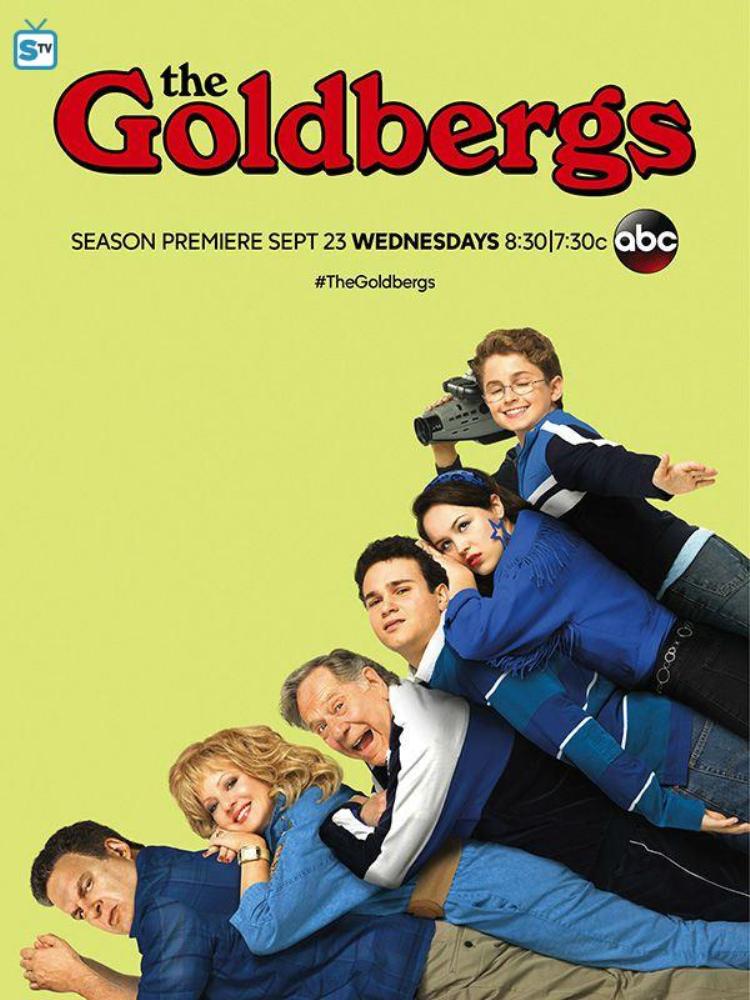 Obviously, your show
is all about it, but in your own words, what was it like growing up in
Jenkintown?
Obviously, your show
is all about it, but in your own words, what was it like growing up in
Jenkintown?
I grew up in Jenkintown in the 80s. Even though
it's just a hop away from downtown Philly, it just felt like such small
town life. Small town suburbia. Just amazing memories of going to the
hobby shop and Martin's Aquarium and walking into town to Elliott's Toy
Store. Riding bikes around the neighborhood and catching fireflies.
All that idyllic suburban 80s, no cell phones, no internet. My best
friend lived across the street. The Kremps lived right across the
street. Emmy Mirsky, [another] character on the show, lived about six
houses down on Newbold Road. So, yeah, just a really small, tiny bubble
that in my mind over the years has grown more and more idyllic.
I have friends who
live on Newbold Road.
Oh, you do?
Yeah. I don't know
if you'd know them. They met your mother when they moved in but I think
you were gone by then.
Gotcha. It's funny. The era of my parents has
ended. All of the kids grew up and got married, and all of the parents
ended up selling their houses. The Kremps are the only ones that still
remain.
To give you an idea,
by the way, we're just off of Rydal on Grove Avenue.
Awesome. I know exactly where you are.
Your house on the
show is much more modest looking than the house you really grew up in.
Was that a conscious choice to make the characters more relatable?
(laughs)
Well, we're in LA, and we have to shoot close to the lot. Nothing
really looked like that, or I would have picked a house that resembled
the house I grew up in. I mean, all I do is show video of the house and
clips and everything. We really couldn't find anything that was
comparable. The house I grew up in is kind of misleading in that even
though it is really big, still up until the day my parents sold it, it
was set in the 80s. They never put any money into it and it was kind of
falling apart. I went back and visited with the new owners. I just
knocked on the door. They watched the show every week, and they are
room by room fixing it up. The kitchen is still exactly the same as it
was in the 80s, which is kind of cool.
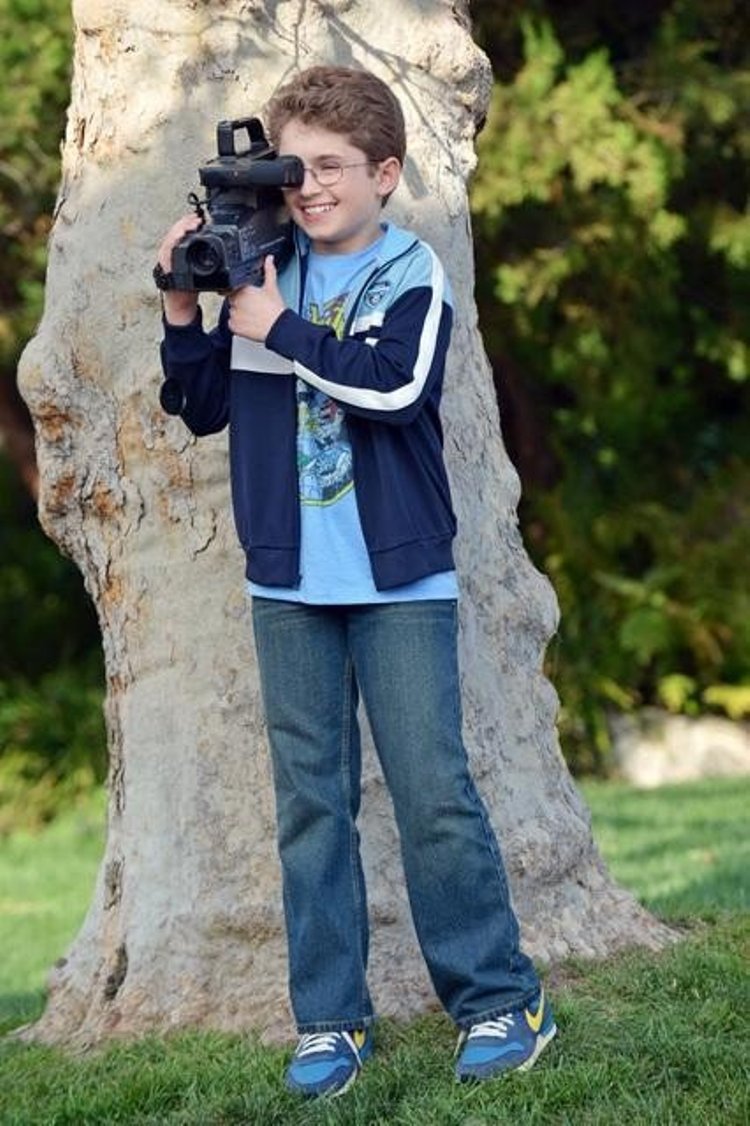 Do you get back here
often?
Do you get back here
often?
I don't. The show, we shoot 24 episodes. It's a
year-round job. So any free time I have, we're in California, so to
travel back is already two days of my limited time, so we just keep to
the west coast nowadays.
How difficult a sell
was it telling the network suits that you wanted it to be all about life
in a very specific, not all that well-known suburb of Philadelphia?
Well, the good thing about Jenkintown is that it's
like Everytown, USA. The show is obviously greatly inspired by The
Wonder Years. I've been very vocal about that. That's my favorite
show, growing up, from the 80s. In that show, they never even mentioned
what town it was, but it reminded me of my town. That was a show about
the suburbs, and that's what this is. So I pitched Jenkintown to the
president of ABC and that didn't mean anything to him. He's from
England. I basically described that it was just Smalltown, USA., riding
bikes, not worried about any dangerous elements. Just feeling free as a
kid to roam around and have adventures. He responded to that.
Right, and even for a
small town, both you and Bradley Cooper are from Jenkintown, and Joey
Lawrence, Matthew Fox, Mike Vogel and Bob Saget are all from neighboring
Abington. What is it about this area you think that so many make it
into show business?
Yeah. (laughs) I don't know. I mean, I
think the thing that all those people... most of those people are around
the same age, right? That's a really good question. I don't know. I
know for me, it was just the time period. Video games were still in
their infancy stage. There were only four television channels. There
was no internet. There were no cell phones. So it was just me and my
friends being bored and making movies, just out of necessity, to keep
ourselves entertained. I had home movies shot all around Jenkintown.
Through that, I learned storytelling and characters and writing jokes.
That was the start for me.
How accurate is the
show's family life to your own, and how much is just having fun? Was
your dad always hanging around in this underwear? Was your mother
always scheming and a smotherer? Does everyone yell?
(laughs)
The truth is, for comedy, I had to tone it down. The reality is – and
it was very much seen in the pilot, which is very polarizing and a lot
of people didn't like – my family is very loud. In a lot of cases it
was going to be an exposé on what it was like growing up in a crazy
family. My original title was How the Hell Am I Normal? What I
did was, when it ended up changing from FOX to ABC, I decided to really
soften it and tone it down. Make it, instead of an exposé, a show that
everyone could relate to. This is not "my family is crazy." This is
all of our families. What I ended up doing, which is kind of crazy, is
I softened it a lot. I took out a lot of the abrasiveness that made
people want to turn off their TV, I think. (chuckles) The only
real difference is my oldest brother's name is Eric, not Erica, who is
the sister.
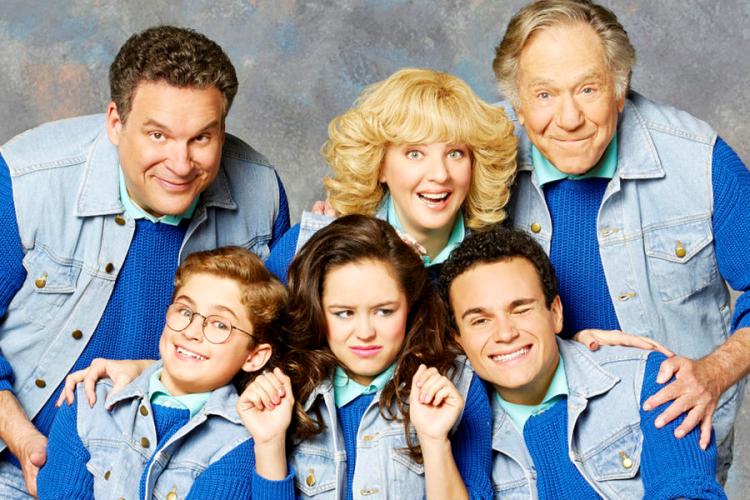 Like you said, you
don't have a sister in real life. Why did you decide you needed one on
the show?
Like you said, you
don't have a sister in real life. Why did you decide you needed one on
the show?
I made that choice because initially the show was
called The Silvers. It was all directly based on my life, but I
wasn't ready to embrace what that meant, so I changed their last name to
the Silvers. In order to make it a little bit different, I made it a
girl, because I thought I could tell different kinds of stories. Then
the president of the network said, "The way into this story is to show
your videos to make it break out from all the other family shows. Show
your videos and make it your life story." So that's how that happened.
What do your family
members think of how they are portrayed?
Look, they love the show. It's the sweetest, nicest
version of my family that could ever be. And it ends with hugs every
episode. (laughs) So, they are very proud. My mom would be
proud if I did anything. Barry has his complaints, as Barry should.
Definitely that character is so broad and ridiculous. But, at the same
time, he recognizes that it's him. Anyone who knows him says, "That
character says things you say, does things that you do." So, yeah, they
all recognize that it's them at the end of the day, and they love it.
How important is it
to you to use real local businesses – like Kremp's Flowers, Wawa, the
Willow Grove Mall, Penn Charter School, etc. – to give the show a
feeling of authenticity?
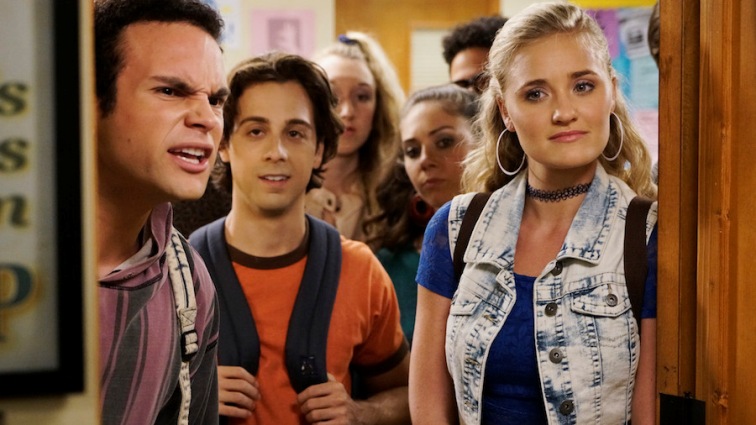 Totally. It's important to nobody but me. I've
gotten into such legal rigmarole, writing so many letters, that people
go, "Just don't name it Wawa. Just name it the Gas & Sip, or
something." To me, that's what makes this show. If I'm going to
embrace the fact that I'm doing a show about me growing up, I want every
location to be the location I went to. I didn't realize that people
would relate to it. It's a very small pocket of people I'm writing to,
but they love that we do the Hiway Theater. They love that they had a
keg party in Alverthorpe Park. Because, growing up, it's like, "We did
that!" I didn't realize that other people would be like, "I totally
relate to these locations and it makes it extra special for me." I just
did it because I wanted to embrace the concept of the show.
Totally. It's important to nobody but me. I've
gotten into such legal rigmarole, writing so many letters, that people
go, "Just don't name it Wawa. Just name it the Gas & Sip, or
something." To me, that's what makes this show. If I'm going to
embrace the fact that I'm doing a show about me growing up, I want every
location to be the location I went to. I didn't realize that people
would relate to it. It's a very small pocket of people I'm writing to,
but they love that we do the Hiway Theater. They love that they had a
keg party in Alverthorpe Park. Because, growing up, it's like, "We did
that!" I didn't realize that other people would be like, "I totally
relate to these locations and it makes it extra special for me." I just
did it because I wanted to embrace the concept of the show.
The show is kind of
vague about when it takes place – incidents happen from throughout the
80s – do you have a specific time period in mind when it happens?
Yeah. Nineteen-Eighty-something. (laughs)
Anything from January 1, 1980 to December 31, 1989. That was the
concept of the show. I built the whole show around that concept of
nineteen-eighty-something, because I knew it would free me up to tell
the stories that I loved and not be constrained to a time period. Also,
this is a show about memories. About popping in videotapes and playing
a random day from your childhood and not remembering when exactly it
was. Everything now is like timestamps. Even your location is
stamped. On these VHS tapes I have, I have no concept of how old I was,
what the year was, what the month was, even what grade I'm in. I don't
even know. So that's the concept of the show. And frankly, the studio
was really confused by it. They insisted the show be set in 1985. In
the pilot, our compromise was I gave a month and a date, but I never
said the year, because they really just didn't understand
nineteen-eighty-something. It wasn't until about ten episodes in when I
was just had free reign to explore the 80s as a time period that they
were like, "Oh, we totally get why you did it." Frankly, it's the only
reason the show's still on the air, I believe.
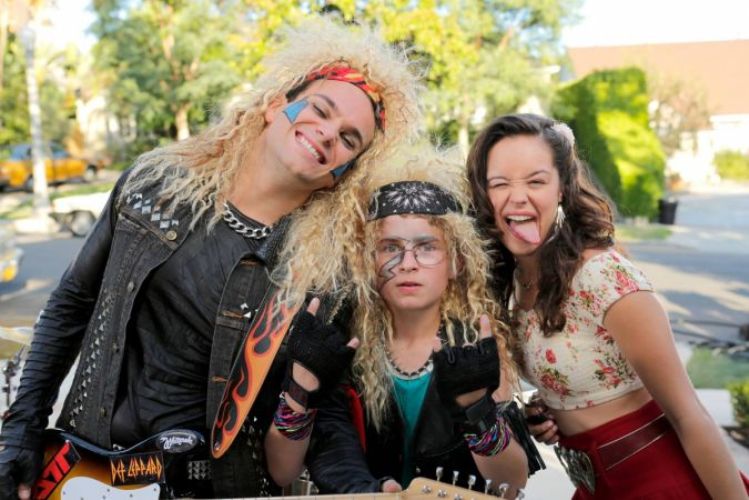 Although the adults
in the cast are all pretty well known, you took a chance to ride the
series on fairly unknown actors as the kids. How did you cast everybody
and what are they like to work with?
Although the adults
in the cast are all pretty well known, you took a chance to ride the
series on fairly unknown actors as the kids. How did you cast everybody
and what are they like to work with?
Two of the three kids had never even been on a set
before. They were so new and so young. That's what I wanted. I wanted
just the authenticity of me and my friends. We weren't LA kids. A lot
of the actors from LA are very polished and have been doing it for years
and years. They come in and they just feel like robots. I didn't want
actors. I wanted real people that you would watch and relate to. Sean
[Giambrone, who plays Adam] is just a kid from Chicago who had done one
commercial. Leslie Litt, who does casting, saw the commercial and said,
"This kid, I think he's cute. I've got a good feeling about him."
Haley [Orrantia], who plays Erica, had been on X-Factor. She
just put herself on tape, taped herself off her iPhone and sent it in.
We just saw her natural gift and ability to do comedy. Troy [Gentile,
who plays Barry] had been doing it since he was a kid, but is just such
a ball of energy that he was really the only choice for Barry. There
was no one else even in contention.
Patton Oswalt has
such a great, distinctive voice. How did he become the voice of the
series?
He's my favorite standup. He does a lot of geek
comedy. I don't think anyone else does [things] quite like [he does].
No one else does a routine on being a Star Trek fan in college
and arguing with a professor. When I heard his standup it kind of blew
my mind. I was like, if I were a standup, this is the kind of material
I'd be doing. We have such similar interests. I'm not an actor, so
when it came to doing the voiceover I am like, who is the voice of me?
The only choice I had was Patton. I'm like, Patton Oswalt. He's a
grown geek man-child, just like me. (laughs) And of course,
had so much voiceover experience. He was the lead in Ratatouille.
It was the perfect fit.
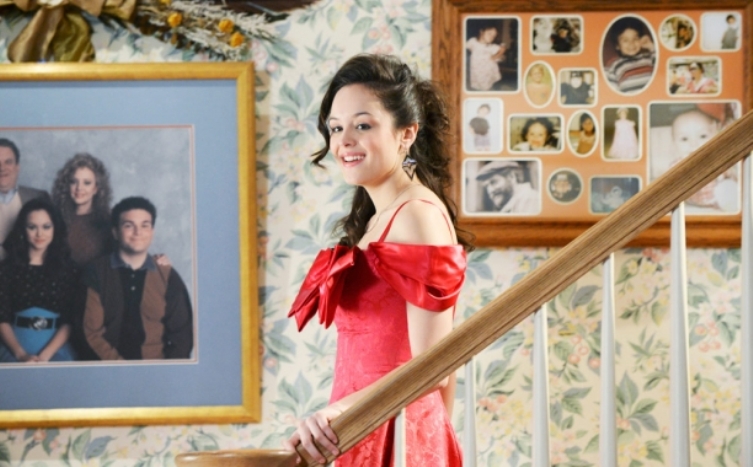 Obviously there are
so many interesting things that happened in the 1980s. What are some of
the one that you haven't hit upon that you still want to cover in The Goldbergs?
Obviously there are
so many interesting things that happened in the 1980s. What are some of
the one that you haven't hit upon that you still want to cover in The Goldbergs?
That's a good question. I'm trying to think. Live
Aid. Live Aid was, of course, in Philly. That was a big deal.
I know. I was there.
Oh, wow. (laughs) We always talked about
Live Aid. Wrestlemania. I think I went to Wrestlemania IV. Just these
big moments from your childhood that you remember so vividly. I'd still
love to do an episode about [Michael Jackson's] "Thriller," which was a
defining song from my childhood. There's definitely ones we always
bring up and talk about. Hands Across America we did this year. We've
been talking about that since day one.
What are some parts
of the 1980s that you definitely don't think would work in the world of
the show?
(sighs)
Well, for every big, fun, splashy pop culture event that you remember,
iconic events that you remember from then, there's like The Challenger
[the Space Shuttle which blew up soon after liftoff.] I was in school
watching that with everybody when it exploded. We were sent home and we
were all traumatized. Again, the show has dramatic moments, and we
often talk about these more dramatic things that you remember. These
experiences growing up. Do they have a place in a show like this? I
think the one we did to the best effect was the Berlin Wall coming
down. I remember being in school when that happened. Just such a
memorable moment. So, I think there are definitely heavier events, and
I'd even talk about exploring those, as well.
If the show keeps
going for several years, do you see the series eventually moving on to
college, grunge, Doc Maartens and the 90s?
(laughs)
It's up in the air right now. There's so much to mine from the 80s
still. Look, the show is about growing up and I grew up out of the 80s
into the 90s. I wouldn't say it's set in stone. I wouldn't be
surprised if it happens. We're approaching season four and I haven't
even aged the kids and no one has even noticed. (laughs) So, I
think it's really just about the kind of stories we want to tell. Once
Eric and Barry are out of the house... look, I grew up. People seem to
be a little taken aback at how much Sean grew up, but those were the
stories that excited me. I grew up. I went through puberty. It was
hard and difficult. I was in high school. I struggled. These are
stories I'm excited to tell. I think a lot of shows, they run out of
steam, but I'm still drawing on real life experiences. This is me I'm
writing about, literally. All those things excite me. So I guess the
answer is, we'll see. Hopefully I'm on that long. I'd love maybe to
explore the 90s, eventually.
Email us Let us know what you think.